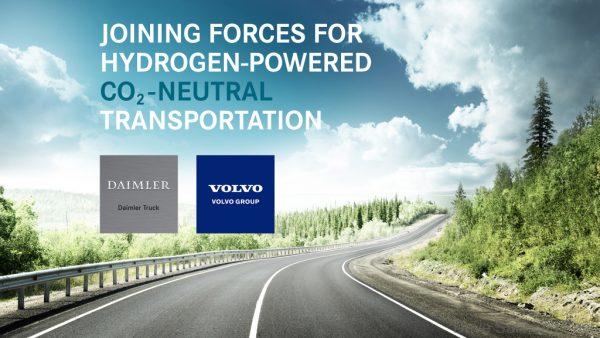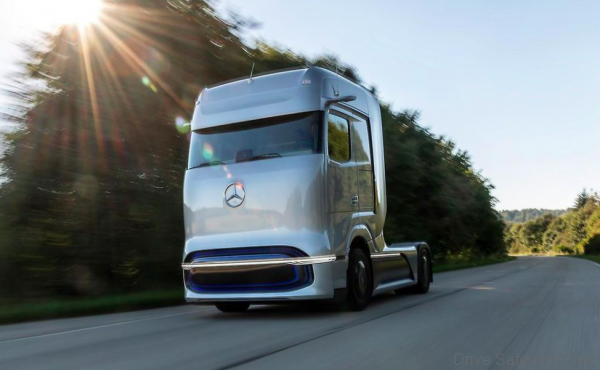New partnership will focus on hydrogen-based fuel-cell systems for use in heavy-duty trucks
Volvo Group, which is the ‘other part’ of the Volvo brand that is not owned by Geely has just made a bid to acquire half of the Daimler subsidiary. Both are truck manufacturers and they have agreed to work together to produce next generation clean energy powertrains.

PRESS RELEASE: The Volvo Group (STO: VOLV-B), a Swedish multinational manufacturing company, and Daimler Truck AG, one of the world’s largest commercial vehicle manufacturers, have jointly announced they have signed a binding agreement for a joint venture to develop, produce and commercialize fuel-cell systems for use in heavy-duty trucks as the primary focus, as well as other applications.
The new joint venture aims at becoming a leading global manufacturer of fuel cells, and thus help the world take a major step towards climate-neutral and sustainable transportation by 2050.
For the purpose, The Volvo Group will acquire 50 percent of the partnership interests in Daimler Truck Fuel Cell GmbH & Co. KG for approximately EUR 0.6 billion on a cash and debt-free basis. Closing of the transaction is expected during the first half of 2021. The transaction is still subject to merger control review by relevant authorities, as well as other approvals.
“For us at Daimler Truck AG and our intended partner, the Volvo Group, the hydrogen-based fuel-cell is a key technology for enabling CO2-neutral transportation in the future. We are both fully committed to the Paris Climate Agreement for decarbonizing road transport and other areas, and to building a prosperous jointly held company that will deliver large volumes of fuel-cell systems,” says Martin Daum, Chairman of the Board of Management of Daimler Truck AG and Member of the Board of Management of Daimler AG.
The joint venture will take advantage of the expertise and extensive experience from several decades of development work on fuel-cells at Daimler.
“In the future, the world will be powered by a combination of battery-electric and fuel-cell electric vehicles, along with other renewable fuels to some extent. The formation of our fuel-cell joint venture is an important step in shaping a world we want to live in,” says Martin Lundstedt, President and CEO of the Volvo Group.

Together, the Volvo Group and Daimler Truck AG have tremendous and longstanding experience in technology development, industrialization and large-scale vehicle production. The future joint venture will be able to benefit from this from the start, which is a unique position for a start-up company. Deep and proven knowledge of modularity, efficiency and reliability will be in place from the get-go, as well as world-leading processes in areas such as quality, production technology and industrialization.

Daimler Truck AG and the Volvo Group are both successful global players thanks to a deep understanding of their customers’ businesses, enabling them to maximize customer value. The future joint venture will build on that tradition to take a similar position in fuel-cells that the Volvo Group and Daimler Truck AG have in commercial vehicles.
In addition to trucks, there are also other areas of application for this type of fuel-cell system. The joint venture will develop a system with several power stages, including a twin system with 300 kW continuous power for heavy-duty long-haul trucks. Based on the demanding conditions in heavy-duty truck applications, the joint venture’s products are also ideally suited for other use cases such as stationary power generation.
In 2020, Rolls-Royce plc and Daimler Truck AG signed an agreement to cooperate on stationary fuel-cell generators for the CO2-neutral emergency power supply of critical facilities such as data centers. The intention is to offer emission-free alternatives to diesel engines, which are currently applied in generators for emergency use. A final cooperation agreement is expected to be signed by the end of the year.
The Volvo Group and Daimler Truck AG will own equal interests in the joint venture, but continue to be competitors in all other areas such as vehicle technology and fuel-cell integration in trucks.
Both companies’ goal is to start with customer tests of trucks with fuel-cells in about three years and to be in series production during the second half of this decade.
Closing of the transaction is expected during the first half of 2021. The transaction is still subject to merger control review by the relevant authorities, as well as other approvals.



